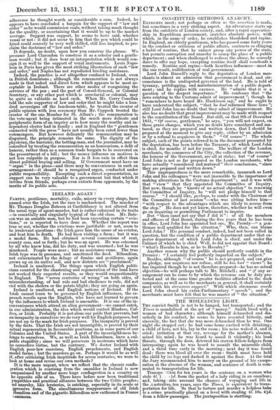CONSTITUTED ORTHODOX ANARCHY.
Earn pars meet; not perhaps so often as the assertion is made, but sometimes in a very striking aspect. An adventurer starts up from the outskirts of London society, and, after a rapid apprentice- ship in Republican government, snatches absolute power, with which, in the name of order, he establishes bloodshed and rapine. In England, an elderly gentleman, who has passed some forty years in the conduct or criticism of public affairs, contracts so clinging a habit of routine, that he cannot grasp any power of the state, but permits corruption and anarchy to usurp the place of a publio department ; and when challenged to redress the abuse, he scarcely dares to offer any hope, excepting routine itself shall vouchsafe a remedy. Routine and rapine—both heartless influences—meet in the one result, nullification of real government.
Lord John Russell's reply to the deputation of London mer- chants is almost an admission that government is dead, and cir- cumstance is the undisputed governor of the land. He is told of tyranny, pettifogging, and maladministration of a public depart- ment; and he replies with excuses. He "admits that it is a question of the deepest importance." He confesses that " the rain relating to the Customs admit of improvement "; though he " remembers to have heard Mr. Huskisson say," and he ought to have understood the subject, "that he had reformed those laws "; still Lord John has no doubt that they admit of improvement. He also has no doubt that great improvement may be made with respect to the constitution of the Board. But still, on that 9th of December 1851, " Of course, gentlemen," he says, " you will not expect, on these grave charges, which you no doubt have considered and ma- tured, as they are prepared and written down, that I should be prepared at the moment to give any reply, either by an admission or by a refusal to acquiesce in them." " Of course ' ! The whole subject, each of the points referred to in the document presented by the deputation, has been before the Treasury, of which Lord John is chief, for months if not for years. The welfare of the London merchants, the commerce of the City, the collection of the revenue, the honour of the Government, are all at stake ; but "of course" Lord John is not so far prepared as the London merchants, who have actually " considered and matured" their conclusions, " aim* they are prepared and written down." This unpreparedness is the more remarkable, inasmuch as Lord John and his colleagues "were not insensible to the importance of making alterations in the Customs department" ; and it was with that " view " that they appointed the Committee of Inquiry. But now, though he "knows of no actual objection" to renewing the Committee of Inquiry, he "will not pledge himself to that course." "I should like, perhaps, to confer with the Chairman of the Committee of last session "—who was sitting before him- " with respect to the advantages which are likely to accrue from the step." He does not yet know, therefore, whether he will even go on inquiring or permitting Parliament to inquire. But " thou cant not say that I did it" : of all the members and officers of that Board, during the five years that he has been in office, Lord John has appointed but one, Mr. Preisly—" a gen- tleman well qualified for the situation." Who, then, can blame Lord John ? His personal conduct, indeed, had not been called in question, but the condition of a public department under that su- perior department of which Lord John is chief, and under the Cabinet of which he is chief. Well, he did not appoint that Board ; " what's Hecuba to him, or he to Hecuba ? "
Another reason why the public should perfectly confide in the Premier : " I certainly feel perfectly impartial on the subject."
Besides, although " of course" he is not prepared, and can give no pledge, nor acquiesce nor refuse, still he has had " views ' • he has inquired though he is not therefore prepared—he has no actual objection—he will perhaps talk to Mr. Mitchell; and " if any ar- rangement can be come to by which the revenue can be duly pro- tected and at the same time greater facilities afforded to the dock companies, as well as to the merchants in general, it shall certainly meet with his strenuous support." With which strenuous words Lord John closed his extra-Parliamentary " speech" ; and the merchants must have felt that he was master of the situation."























 Previous page
Previous page